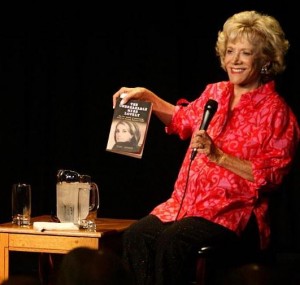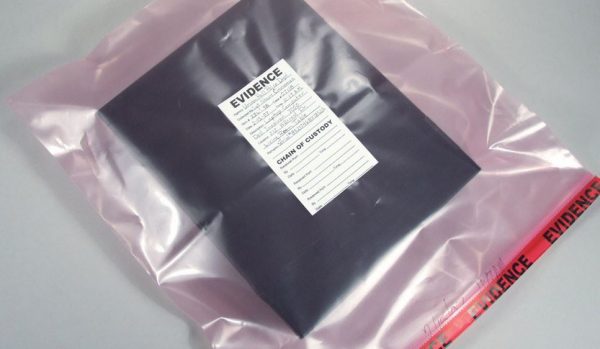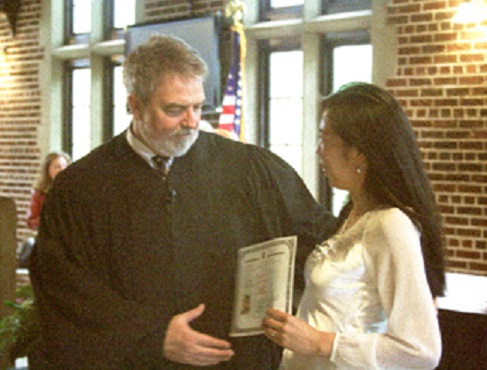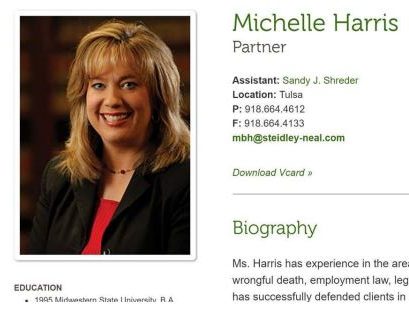It’s the kind of nightmare courtroom scenario that keeps all but a few lawyers from going near litigation with the Church of Scientology.
On August 26, a woman who for two years has been suing numerous Scientology-connected people and entities was ordered by a federal district court to turn over the entire contents of her personal laptop hard drive to the people she was suing.
Everything on her hard drive. Her personal emails with her own attorneys. Emails to her family members. Her personal photographs. Her personal medical records. Even photographs of her breasts that she had taken to document her fight against breast cancer.
Gigabytes of intensely personal information and photos and passcodes, all handed over by a federal magistrate judge to the attorneys representing Scientology’s entities.
And only after that ruling was made did the woman’s attorneys learn a barely believable additional detail. The judge who made that ruling? Before he became a judge in 2003, he had worked for the very law firm he turned the woman’s laptop over to, a law firm where his wife still works to this day.
People occasionally tell us they want to sue the Church of Scientology. And we always ask them, do you have any idea what you’re in for?
We first learned about Karla Taylor and the National Association of Forensic Counselors in 2013. Two former officials who had worked at Scientology’s Narconon drug rehabs, Lucas Catton and Eric Tenorio, had come forward to tell harrowing stories about how Narconon clinics deceived potential customers and put patients at risk (a story they told NBC’s Rock Center). In particular, they alleged that the staffs at Scientology rehabs had obtained counseling credentials in fraudulent ways and were misrepresenting those credentials on websites in order to fool potential patients.
Narconon employees claimed to be tested as “Certified Chemical Dependency Counselors” by the NAFC. But Tenorio and Catton said that some of the CCDC certificates had been obtained in bogus ways, and Taylor learned that many staff members who claimed to hold CCDC certs had let them expire years before. Narconon websites, meanwhile, made misleading claims that the NAFC approved of what was happening in the rehabs.
Taylor spent more than a year gathering evidence about the way Narconon clinics were misusing NAFC logos and certifications before she filed suit in May 2014, initially naming 82 defendants — including numerous Scientology Narconon rehab centers as well as Scientology leader David Miscavige. With the help of attorney David Keesling, Taylor, an Indiana resident, filed the lawsuit in Oklahoma, where Scientology’s flagship rehab, Narconon Arrowhead, was located. The NAFC lawsuit was ambitious; it alleged that individual rehabs were misrepresenting their certifications in a widespread conspiracy involving Miscavige himself. And if the goal was ambitious, the potential payout under trademark law was huge, our legal experts told us.
But Scientology did not gain its scorched-earth litigation reputation for nothing. Soon, Karla Taylor began to learn just what it meant to live with Scientology diving into her personal history, looking for any edge in the case.
We learned in November 2014 that Scientology had hit paydirt digging into Taylor’s private life, and they made sure news organizations heard about it. Her husband, Frank Palani, turned out to be a scumbag of legendary proportions. Under a previous name, Frank Deisler, he was committing horrible crimes by the time he was 13 and raped a 7 year old girl. He went on to commit armed robberies and more rapes as an adult. In one scheme, he and a friend targeted homes that were for sale, raping women who were home while their husbands were at work.
Somehow, after he served prison time for his crimes, Deisler lied his way into getting the credentials to counsel drug abusers and sex offenders, which never should have happened if the state agencies that licensed him had looked into his past.
Karla Taylor’s attorney Deesling insisted to us that Deisler’s criminal history had happened many years before Taylor met him, and she had no knowledge of it. He went to prison, Deesling said, when Taylor was just a toddler (he was 31 years her senior). And even though the two of them had founded the National Association of Forensic Counselors, Deesling said that Deisler had retired and was no longer its president, and Karla was divorcing Deisler because he had not been truthful with her.
But Scientology’s attorneys had their theme. In court documents, they have continued to tell the tale that the NAFC was founded as an illegitimate enterprise, and that it never had any business certifying people for sensitive work. (That didn’t explain, however, why Scientology had gladly used the NAFC’s certifications for years to give the impression that its drug rehabs were more legitimate than they actually were.)
For the past year, the two sides have been going through the discovery process, producing tens of thousands of pages of documents, sitting for depositions, and answering interrogatory questions. Deadlines for that process approached this summer, and some of the defendants were using the material they’d gained from Taylor and NAFC to prepare motions for summary judgment to try and get the lawsuit thrown out of court.
And then, in August, Taylor ran into problems turning over interrogatory answers by the court’s deadline. After missing one due date, her answers were promised to Narconon’s attorneys by August 8 when her laptop was hacked on the night of August 7. The hacking was so thorough, and had put in so many controls on her machine, she couldn’t get access to her own hard drive. According to court filings, she overnighted the laptop to a security firm in Florida on August 8 to have it inspected and unlocked.
Naturally, Narconon’s attorneys complained bitterly to Oklahoma Federal District Judge Ronald White’s magistrate judge, Steven Shreder, who was handling the discovery process. On August 26, as punishment for missing the deadline, Judge Shreder ordered that data from Taylor’s laptop hard drive, as well as the NAFC business server, be turned over by a third party IT firm to the defendants’ attorneys.
A transcript captures how much Shreder’s decision stunned Paul DeMuro, the lawyer handling the matter for Taylor in court that day.
Paul DeMuro: Well, I, I just — it is an extraordinary ruling, Your Honor.
Judge Steven Shreder: Well, I think we are in an extraordinary situation here.
DeMuro: …You are giving them the keys to the kingdom that have nothing to do with this case. Her emails with her pastors? Her administrative passcodes?
Shreder: Well, what I said was the consultant can reveal the contents of the hard drive to the attorneys. At the moment that is the order of the Court. Now, if we need to broaden that later on, I will, but right now only the attorneys for the defendants.
DeMuro: Well, I, I am — I don’t know what to say, Your Honor. I understand your order and I am — I am just flabbergasted by its scope and the extraordinary nature of it and I don’t understand how it could be that we can’t be given a couple of days to stay the order given the interests that are at stake.
Shreder: You all understand what I’m ordering as well, right?
[Defendant attorney] Matthew Furton: Yes, sir.
Shreder: OK.
Taylor’s attorneys immediately scrambled in an attempt to head off Shreder’s ruling. District Judge White upheld his magistrate judge’s decision. And the US Tenth Circuit court of appeals denied Taylor’s petition for a writ of mandamus to overturn the ruling, saying that a dispute over a laptop between two private parties was not “a question of substantial importance to the administration of justice.”
Meanwhile, Taylor’s attorneys learned a surprising fact about Judge Shreder. Before he had become a judge in 2003, he had worked as an attorney for Steidley & Neal, an Oklahoma law firm that was among those representing defendants in the lawsuit. At one point, Steidley & Neal had represented 40 of the 82 original defendants sued by Taylor and the NAFC. But 37 of those defendants were voluntarily dropped from the suit in 2015, and the firm today represents three defendants: Jason Burdge, the deputy executive director at Best Drug Rehabilitation, a Narconon-style Michigan rehab that’s part of a small empire run by former Narconon official Per Wickstrom; Robert Newman, senior director for public relations at Narconon Arrowhead in Oklahoma; and the Rev. James McLaughlin, a Houston Methodist minister who is often asked to vouch for Narconon centers.
Appearing for the three defendants in the lawsuit is Steidley & Neal attorney Michelle Harris, whose personal page at the Steidley & Neal website listed as her legal assistant a woman by the name of Sandy J. Shreder.
Sandy Shreder is married to Judge Steven Shreder.
On September 2, Taylor’s attorneys filed a motion to have Judge Shreder disqualified from the case because of his connections to Steidley & Neal, the lawyers who now have possession of Karla Taylor’s gigabytes of personal and private information. (The defendants responded that although Sandy Shreder worked for Steidley & Neal, she had not actually worked on the lawsuit, and so there was no conflict that should disqualify Judge Shreder. No decision on the motion has yet been made.)
Meanwhile, (yes, it gets worse), Taylor’s attorney, Paul DeMuro, sent an email to the defendants’ attorneys, imploring them to keep confidential what was on Taylor’s hard drive. To make sure they understood what they had been given possession of, he spelled out some of the private things in Taylor’s data, including the fact that she had taken photos of her breasts as part of her breast cancer treatment.
The Narconon attorneys then turned around and placed DeMuro’s email on the court record as an exhibit objecting to the request for confidentiality, so that the news of Taylor’s battle with breast cancer and other private matters became a public document. (And that’s how we learned about it, as we were perusing the latest filings in the case and were shocked to see what the Narconon attorneys had put on the record.)
We called Keesling, asking him about what appeared to be an intentional exposure of Karla Taylor’s most intimate personal information by Narconon’s attorneys. “She’s devastated,” he told us, but he added that Taylor was still determined to fight the case. She understood, he said, that her information was now a public record and would become the subject of a news story. But he said it had actually emboldened her, and she wanted the public to know to what extremes her opponents are willing to go.
There have been responses back and forth to the motion to disqualify Judge Shreder, and we’re posting the most recent, which describes arguments on both sides.
And we’ll be watching to see if Judge Shreder is disqualified or if Taylor can get her personal data out of the hands of Scientology’s attorneys from what appears to be an increasingly hostile court.
NAFC vs. Narconon: Reply in Support to Disqualify Judge Shreder by Tony Ortega on Scribd
——————–
 ‘The Unbreakable Miss Lovely’ audiobook now on sale
‘The Unbreakable Miss Lovely’ audiobook now on sale
Audible.com has released the audiobook version of The Unbreakable Miss Lovely: How the Church of Scientology tried to destroy Paulette Cooper and you can get the book for free if you’re signing up at Audible for the first time!
Read by the author (that’s us), the book tells the incredible tale of a journalist who was among the first to expose Scientology’s controversies, and nearly paid for it with her life. Go to Audible’s website for more details — [US version] [UK version]
To support the Audible launch, Paulette Cooper joined us for an “Ask Me Anything” session at Reddit on September 29, which covered a lot of topics about the book and about this website.
——————–
 Posted by Tony Ortega on October 7, 2016 at 07:00
Posted by Tony Ortega on October 7, 2016 at 07:00
E-mail tips and story ideas to tonyo94 AT gmail DOT com or follow us on Twitter. We post behind-the-scenes updates at our Facebook author page. After every new story we send out an alert to our e-mail list and our FB page.
Our book, The Unbreakable Miss Lovely: How the Church of Scientology tried to destroy Paulette Cooper, is on sale at Amazon in paperback, Kindle, and audiobook versions. We’ve posted photographs of Paulette and scenes from her life at a separate location. Reader Sookie put together a complete index. More information about the book, and our 2015 book tour, can also be found at the book’s dedicated page.
Learn about Scientology with our numerous series with experts…
BLOGGING DIANETICS: We read Scientology’s founding text cover to cover with the help of L.A. attorney and former church member Vance Woodward
UP THE BRIDGE: Claire Headley and Bruce Hines train us as Scientologists
GETTING OUR ETHICS IN: Jefferson Hawkins explains Scientology’s system of justice
SCIENTOLOGY MYTHBUSTING: Historian Jon Atack discusses key Scientology concepts
Other links: Shelly Miscavige, ten years gone | The Lisa McPherson story told in real time | The Cathriona White stories | The Leah Remini ‘Knowledge Reports’ | Hear audio of a Scientology excommunication | Scientology’s little day care of horrors | Whatever happened to Steve Fishman? | Felony charges for Scientology’s drug rehab scam | Why Scientology digs bomb-proof vaults in the desert | PZ Myers reads L. Ron Hubbard’s “A History of Man” | Scientology’s Master Spies | Scientology’s Private Dancer | The mystery of the richest Scientologist and his wayward sons | Scientology’s shocking mistreatment of the mentally ill | Scientology boasts about assistance from Google | The Underground Bunker’s Official Theme Song | The Underground Bunker FAQ
Our Guide to Alex Gibney’s film ‘Going Clear,’ and our pages about its principal figures…
Jason Beghe | Tom DeVocht | Sara Goldberg | Paul Haggis | Mark “Marty” Rathbun | Mike Rinder | Spanky Taylor | Hana Whitfield










